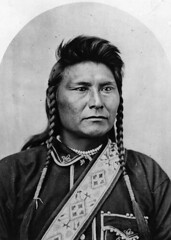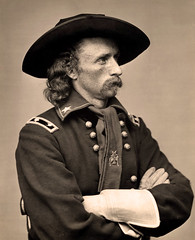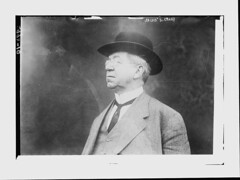Chapter 26 - The American Pageant 12th Edition Flashcards
A review of Chapter 26 in The American Pageant
Terms : Hide Images [1]
| 459977782 | 100 Degrees | A line designated by John Wesly Powell in 1874. Farmers were warned that past this line, agriculture is impossible without massive irrigation. One homesteader declared, "There is no God west of Salina." |  | 0 |
| 459977783 | 16 to 1 | The idea held by those who supported the Gold Standard. It was based on the idea that 16 oz. of Silver should equal 1 oz. of Gold as far as value although the real value was about 32:1. This was still a rallying cry of a majority of the Democratic Party. |  | 1 |
| 459977784 | Apache Indians | Fierce tribes hailing from Arizona and New Mexico, they were considered to be the most difficult Indians to subdue. Led by Geronimo, whose eyes blazed hatred of the whites, they were pursued into Mexico by federal troops using the sun-flashing heliograph, a communication device, which impressed the Indians as "big medicine." Scattered remnants of the warriors were finally persuaded to surrender after the their women had been exiled to Florida. They ultimately became successful farmers in Oklahoma, where they raised stock instead of raiding settlements |  | 2 |
| 459977785 | Bryan's Cross of Gold Speech | A speech that supported bimetallism by William Jennings Bryan that was delivered at the Democratic National Convention in 1896. This speech swept the Democrats off their feet and as a result, Bryan was on the fifth ballot. |  | 3 |
| 459977786 | Chief Joseph | Chief Joseph, the leader of the Nez Perce, convinced his people to run away. It was an incredible chase, but they were caught eventually. When he became chief of the Nez Perce Indian tribe in the American Northwest in 1871, Joseph led his people in an unsuccessful resistance to white settlers who were confiscating land. The tribe was ordered to move. Joseph agreed, but when three of his tribe killed a group of settlers, he attempted to escape to Canada with his followers. |  | 4 |
| 459977787 | Colonel J.M. Chivington | Ordered the militia to massacre about 400 Indians in cold blood at Sand Creek, Colorado in 1864 who posed no threat (the Chivington Massacre). | 5 | |
| 459977788 | Comstock Lode | First discovered in 1858 by Henry Comstock, some of the most plentiful and valuable silver was found here, causing many Californians to migrate here, and settle Nevada. |  | 6 |
| 459977789 | The Dawes Act | Passed by Congress in 1887. Its purpose was to Americanize the Native Americans. The act broke up the reservations, gave some of the land to Native Americans. The government was to sell the remainder to white settlers and use the income from that sale for Native Americans to buy farm equipment. But by 1932 white settlers had taken 2/3 of reservation territory, and Native Americans received no money from the sale of the reservations. |  | 7 |
| 459977790 | Dingley Tariff | Passed in 1897, the highest protective tariff in U.S. history with an average duty of 57%. It replaced the Wilson - Gorman Tariff, and was replaced by the Payne - Aldrich Tariff in 1909. It was pushed through by big Northern industries and businesses. |  | 8 |
| 459977791 | Eugene V. Debs | Leader of the American Railway Union, he voted to aid workers in the Pullman strike. He was jailed for six months for disobeying a court order after the strike was over. |  | 9 |
| 459977792 | Farmers' Alliance | A Farmers' organization founded in late 1870s; worked for lower railroad freight rates, lower interest rates, and a change in the governments tight money policy |  | 10 |
| 459977793 | General Custer | Was a union soldier during the civil war. Was ordered to defeat the Lakota. After what he felt was a victory, he ordered and immediate attack on the Indian Village, but was defeated during the battle of Little Big Horn- all his men died. |  | 11 |
| 459977794 | General Jacob S. Coxey | set out for Washington in 1894 with a demand that the government relieve unemployment by an inflationary public works program |  | 12 |
| 459977795 | Geronimo | He was the leader of the Apaches in Arizona and New Mexico, fought against the white man, who was trying to force the Apaches off of their land. Geronimo had an enormous hatred for the whites. He was, however, eventually pushed into Mexico where he surrendered |  | 13 |
| 459977796 | Ghost Dance | A cult that tried to call the spirits of past warriors to inspire the young braves to fight. It was crushed at the Battle of Wounded Knee after spreading to the Dakota Sioux. The Ghost Dance led to the Dawes Severalty Act of 1887. This act tried to reform Indian tribes and turn them into "white" citizens. It did little good. | 14 | |
| 459977797 | Granger Laws | (GC) , Grangers state legislatures in 1874 passed law fixing maximum rates for freight shipments. The railroads responded by appealing to the Supreme Court to declare these laws unconstitutional | 15 | |
| 459977798 | Greenback Labor | the political party of the 1870's-1880's that combined an appeal for inflated currency for farmers witrh an appeal for improved conditions of labor |  | 16 |
| 459977799 | Greenback Movement | Movement of farmers seeking relief from deflation by increasing the supply of government issued paper currency called greenbacks. | 17 | |
| 459977800 | Hanna's Slush Fund | A term that refers to the fund money raised by Mark Hanna, chairman of the Republican National Committee. He used the money to support the campaign that was called a "campaign of education" but some saw it as a campaign of propaganda. Regadless, Hanna was able to use the fear of bimettalism to rise to the lead money raiser. They raised about $16 million. In the end, the Republicans put McKinley in office with this money. | 18 | |
| 459977801 | Harvey's Coin's Financial School | the 1894 pamphlet that used fiction and over-simplification to promote the cause for free silver | 19 | |
| 459977802 | Helen Hunt Jackson | A writer. Author of the 1881 book A Century of Dishonor. The book exposed the U.S. governments many broken promises to the Native Americans. For example the government wanted Native Americans to assimilate, i.e. give up their beliefs and ways of life, that way to become part of the white culture. | 20 | |
| 459977803 | The Homestead Act of 1862 | provided a settler with 160 acres of land if he promised to live and work for it at least five years, about 500,000 families took advantage of it | 21 | |
| 459977804 | James B. Weaver | He was a general during the Civil War. He was chosen as the presidential candidate of the Populist party. He was a Granger with an apt for public speaking. He only ended up getting three percent of the popular votes which is really a large number for a third party candidate. | 22 | |
| 459977805 | Joseph F. Glidden | 1874 invented a superior type of barbed wire and in 1883 the company was producing 600 miles of the product each day; the barbed wire was used against trespassing cattle | 23 | |
| 459977806 | The Battle of Little Big Horn | Battle in which Colonel George A. Custer and the Seventh Cavalry were defeated by the Sioux and Cheyennes under Sitting Bull and Crazy Horse in Montana in 1876. |  | 24 |
| 459977807 | Long Drive | General Term for the herding of cattle from the grassy plains to the railroad terminals of Kansas, Nebraska, and Wyoming | 25 | |
| 459977808 | Marcus Alonzo Hanna | Iron tycoon from Ohio who helped to elect McKinley with his strong endorsement, "I love McKinley". Served as kingmaker and campaign manager, trying to make the focus of the election the tariff. | 26 | |
| 459977809 | Mary Elizabeth Lease | became well known during the early 1890's for her actions as a speaker for the populist party. She was a tall, strong woman who made numerous and memorable speeches on behalf of the downtrodden farmer. She denounced the money-grubbing government and encouraged farmers to speak their discontent with the economic situation. | 27 | |
| 459977810 | Nez Perce | in 1877 Chief Joseph of this specific Indian Nation surrendered to units of the U.S. Cavalry. Before this retreat they fought a cunning strategic retreat toward refuge in Canada from about 2,000 Army soldiers. This surrender, after fighting 13 battles and going about 1,600 miles toward Canada, marked the last great battle between the U.S. government and an Indian nation | 28 | |
| 459977811 | Oliver H. Kelley | (GC), considered the "Father" of the Order of Patrons of Husbandry (more commonly known as "The Grange"). a fraternal organization for American farmers that encouraged farm families to band together for their common economic and political good. |  | 29 |
| 459977812 | Grange | an association formed by farmers in the last 1800s to make life better for farmers by sharing information about crops, prices, and supplies |  | 30 |
| 459977813 | Pikes Peak or Bust | In 1859, rumors of gold "everywhere you stick your shovel" at pike's peak, colorado, brought on a stampede of wagons painted with the slogan "Pike's Peak or bust!" the rumors turned out to be exaggerated |  | 31 |
| 459977814 | People's Party / Populist Party | U.S. political party formed in 1892 representing mainly farmers, favoring free coinage of silver and government control of railroads and other monopolies, formed in 1892, the populist party was created by farmers' alliances. The peoples' party supported the abolition of national banks and the government ownership of railroads |  | 32 |
| 459977815 | Pullman Strike | 1894 - nonviolent strike (brought down the railway system in most of the West) at the Pullman Palace Car Co. over wages - Prez. Cleveland shut it down because it was interfering with mail delivery |  | 33 |
| 459977816 | Reed's Rules | procedural guidelines used by the majority-party leadership for determining who sits on which committees, how the order of business should be decided, and how the majority party should limit the powers of the minority party. | 34 | |
| 459977817 | Sand Creek, Colorado | Site of Indian massacre by militia forces led by Colonel J.M. Chivington in 1864, 400 Indians including men, women, and children killed |  | 35 |
| 459977818 | Thomas B. Reed | Republican Speaker of the House in 1888. He had strict control over Congress and passed the McKinley Act. | 36 | |
| 459977819 | William F. Cody | Known better by his stage name Buffalo Bill, he was an American soldier, bison hunter and showman. He was born in the Iowa Territory ,now the American state of Iowa, near Le Claire. He was one of the most colorful figures of the Old West, and mostly famous for the shows he organized with cowboy themes. He received the Medal of Honor |  | 37 |
| 459977820 | William Jenning Bryan | Dominant democratic seaker and author of the "Cross of Gold" speech. He runs for president multiple times but never succeeds. | 38 | |
| 459977821 | The Wounded Knee Massacre | Marked the end of four centuries of armed conflict between the continent's native population and European settlers and their descendants. The U.S. Army's killing of approximately 300 Sioux was seen differently by different people. Those who supported the army's slaying of natives called it a battle, but those who were in favor of the natives reffered to it as a massacre. |  | 39 |
| 459977822 | Wyoming Stock Grower's Association | the organization in the West in the 1880's that used its power to control the state and its legislature for the benefit of the cattle interests | 40 | |
| 459977823 | Safety Valve | The theory is that when hard times came, the unemployment who cluttered the city pavements merely moved west, took up farming and prospered. | 41 | |
| 459977824 | Crazy Horse | a chief of the Sioux who resisted the invasion of the Black Hills and joined Sitting Bull in the defeat of General Custer at Little Bighorn (1849-1877) |  | 42 |
